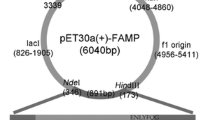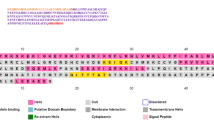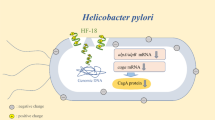Abstract
Human neutrophil peptide 1 (HNP1) is a small (3.44 kDa) cationic peptide that is a distinct member of the defensin family. HNP1 plays a crucial role in controlling bacterial infections, particularly by antibiotic-resistant bacteria, through membrane perforation patterns. The structural characteristics of HNP1’s three intramolecular disulfide bridges cause difficulty in its synthesis via chemical methods. In this study, bioactive recombinant HNP1 was produced using the Pichia pastoris (P. Pichia) expression system. HNP1 was fused with the polyhedrin of Bombyx mori and enhanced green fluorescent protein (EGFP) to prevent HNP1 toxicity in yeast host cells under direct expression. An enterokinase protease cleavage site (amino acid sequence DDDDK) was designed upstream of the HNP1 peptide to obtain the antibacterial peptide HNP1 with native structure after it was cleaved by the enterokinase. The fusion HNP1 protein (FHNP1) was successfully expressed and had a molecular mass of approximately 62.6 kDa, as determined using SDS-PAGE and Western blot. Then, the recovered FHNP1 was digested and purified; Tricine-SDS-PAGE results showed that HNP1 was successfully released from FHNP1. Functional analysis of induction against antibiotic-resistant Helicobacter pylori (H. pylori) showed that it was challenging for HNP1 to acquire resistance to the antibiotic-resistant H. pylori. Moreover, in vitro studies showed that HNP1 exerted a strong effect against antibiotic-resistant H. pylori activity. Furthermore, the animal model of H. pylori infection established in vivo showed that HNP1 significantly reduced the colonization of antibiotic-resistant H. pylori in the stomach. Our study indicated that this could be a new potential avenue for large-scale production of HNP1 for therapeutic application against the antibiotic-resistant H. pylori infection in humans.






Similar content being viewed by others
References
Abad S, Nahalka J, Winkler M, Bergler G, Speight R, Glieder A, Nidetzky B (2011) High-level expression of Rhodotorula gracilis D-amion acid oxidase in Pichia pastoris. Biotechnol Lett 33:557–563. https://doi.org/10.1007/s10529-010-0456-9
Arai R, Ueda H, Kitayama A, Kamiya N, Nagamune T (2001) Design of the linkers which effectively separate domains of a bifunctional fusion protein. Protein Eng 14:529–532
Ahmad M, Hirz M, Pichler H, Schwab H (2014) Protein expression in Pichia pastoris: recent achievements and perspectives for heterologous protein production. Appl Microbiol Biotechnol 98:5301–5317. https://doi.org/10.1007/s00253-014-5732-5
Akbarzadeh A, Ranaei Siadat SO, Motallebi M, Zamani MR, Barshan Tashnizi M, Moshtaghi S (2014) Characterization and high level expression of acidic endoglucanase in Pichia pastoris. Appl Biochem Biotechnol 172:2253–2265. https://doi.org/10.1007/s12010-013-0672-6
Berrin JG, Williamson G, Puigserver A, Chaix JC, McLauchlan WR, Juge N (2000) High-level production of recombinant fungal endo-beta-1,4-xylanase in the methylotrophic yeast Pichia pastoris. Protein Expr Purif 19:179–187. https://doi.org/10.1006/prep.2000.1229
Boyanova L (2009) Prevalence of multidrug-resistant Helicobacter pylori in Bulgaria. J Med Microbiol 58:930–935. https://doi.org/10.1099/jmm.0.009993-0
Brogden KA (2005) Antimicrobial peptides: pore formers or metabolic inhibitors in bacteria? Nat Rev Microbiol 3:238–250. https://doi.org/10.1038/nrmicro1098
Bytzer P, Dahlerup JF, Eriksen JR, Jarbøl DE, Rosenstock S, Wildt S (2011) Diagnosis and treatment of Helicobacter pylori infection. Dan Med Bull 58:C4271
Cereghino JL, Cregg JM. 2000. Heterologous protein expression in the methylotrophic yeast Pichia pastoris. FEMS Microbiol Rev 24: 45–66 dio:https://doi.org/10.1111/j.1574-6976.2000.tb00532.x.
Cregg JM, Cereghino JL, Shi J, Higgins DR (2000) Recombinant protein expression in Pichia pastoris. Mol Biotechnol 16: 23–52 dio:https://doi.org/10.1385/MB:16:1:23.
Cereghino GPL, Cereghino JL, Ilgen C, Cregg JM (2002) Production of recombinant proteins in fermenter cultures of the yeast Pichia pastoris. Curr Opin Biotech 13:329–332. https://doi.org/10.1016/S0958-1669(02)00330-0
Chey WD, Wong BC (2007) American College of Gastroenterology guideline on the management of Helicobacter pylori infection. Am J Gastroenterol 102:1808–1825. https://doi.org/10.1111/j.1572-0241.2007.01393.x
Damasceno LM, Huang CJ, Batt CA (2012) Protein secretion in Pichia pastoris and advances in protein production. Appl Microbiol Biotechnol 93:31–39. https://doi.org/10.1007/s00253-011-3654-z
Easton DM, Nijnik A, Mayer ML, Hancock RE (2009) Potential of immunomodulatory host defense peptides as novel anti-infectives. Trends Biotechnol 27:582–590. https://doi.org/10.1016/j.tibtech.2009.07.004
Fock KM, Katelaris P, Sugano K, Ang TL, Hunt R, Talley NJ, Lam SK, Xiao SD, Tan HJ, Wu CY, Jung HC, Hoang BH, Kachintorn U, Goh KL, Chiba T, Rani AA (2009) Second Asia-Pacific Consensus Guidelines for Helicobacter pylori infection. J Gastroenterol Hepatol 24:1587–1600. https://doi.org/10.1111/j.1440-1746.2009.05982.x
Ganz T, Lehrer RI (1997) Antimicrobial peptides of leukocytes. Curr Opin Hematol 4:53–58
Gisbert JP, González L, Calvet X, García N, López T, Roqué M, Gabriel R, Pajares JM (2000) Proton pump inhibitor, clarithromycin and either amoxycillin or nitroimidazole: a meta-analysis of eradication of Helicobacter pylori. Aliment Pharmacol Ther 14:1319–1328. https://doi.org/10.1046/j.1365-2036.2000.00844.x
Guo Q, Guo S, Zhang Y (2013) Treatment of gastric MALT lymphoma with a focus on Helicobacter pylori eradication. Int J Hematol 97:735–742. https://doi.org/10.1007/s12185-013-1348-2
Graham DY, Fischbach L (2010) Helicobacter pylori treatment in the era of increasing antibiotic resistance. Gut 59:1143–1153. https://doi.org/10.1136/gut.2009.192757
Hancock RE, Sahl HG (2006) Antimicrobial and host-defense peptides as new anti-infective therapeutic strategies. Nat Biotechnol 24:1551–1557. https://doi.org/10.1007/s00726-012-1379-7.
Hilpert K, Volkmer-Engert R, Walter T, Hancock RE (2005) High-throughput generation of small antibacterial peptides with improved activity. Nat Biotechnol 23:1008–1012. https://doi.org/10.1038/nbt1113
Jones DE, Bevins CL (1992) Paneth cells of the human small intestine express an antimicrobial peptide gene. J Biol Chem 267:23216–23225
Jones DE, Bevins CL (1993) Defensin-6 mRNA in human Paneth cells: implications for antimicrobial peptides in host defense of the human bowel. FEBS Lett 315:187–192. https://doi.org/10.1016/0014-5793(93)81160-2.
Kavoosi M, Creagh AL, Kilburn DG, Haynes CA (2007) Strategy for selecting and characterizing linker peptides for CBM9- tagged fusion proteins expressed in Escherichia coli. Biotechnol Bioeng 98:599–610. https://doi.org/10.1002/bit.21396
Khine AA, Del Sorbo L, Vaschetto R, Voglis S, Tullis E, Slutsky AS, Downey GP, Zhang H (2006) Human neutrophil peptides induce interleukin-8 production through the P2Y6 signaling pathway. Blood 107:2936–2942. https://doi.org/10.1182/blood-2005-06-2314
Kuipers EJ (1997) Helicobacter pylori and the risk and management of associated diseases: gastritis, ulcer disease, atrophic gastritis and gastric cancer. Aliment Pharmacol Ther 11(Suppl 1):71–88. https://doi.org/10.1046/j.1365-2036.11.s1.5.x
Latiffi AA, Salleh AB, Rahman RN, Oslan SN, Basri M (2013) Secretory expression of thermostable alkaline protease from Bacillus stearothermophilus FI by using native signal peptide and α-factor secretion signal in Pichia pastoris. Genes Genet Syst 88:85–91. https://doi.org/10.1266/ggs.88.85
Lee CW, Rickman B, Rogers AB, Ge Z, Wang TC, Fox JG (2008) Helicobacter pylori eradication prevents progression of gastric cancer in hypergastrinemic INS-GAS mice. Cancer Res 68:3540–3548. https://doi.org/10.1158/0008-5472.CAN-07-6786
Lehrer RI (2004) Primate defensins. Nat Rev Microbiol 2:727–738. https://doi.org/10.1038/nrmicro976
Lehrer RI, Barton A, Daher KA, Harwig SS, Ganz T, Selsted ME (1989) Interaction of human defensins with Escherichia coli. Mechanism of bactericidal activity. J Clin Invest 84:553–561. https://doi.org/10.1172/JCI114198
Lehrer RI, Ganz T (2002) Cathelicidins: a family of endogenous antimicrobial peptides. Curr Opin Hematol 9:18–22
Lehrer RI, Lichtenstein AK, Ganz T (1993) Defensins: antimicrobial and cytotoxic peptides of mammalian cells. Annu Rev Immunol 11:105–128. https://doi.org/10.1146/annurev.iy.11.040193.000541
Lehrer RI, Lu W (2012) α-Defensins in human innate immunity. Immunol Rev 245:84–112. https://doi.org/10.1111/j.1600-065X.2011.01082.x
Lopes D, Nunes C, Martins MC, Sarmento B, Reis S (2014) Eradication of Helicobacter pylori: past, present and future. J Control Release 189:169–186. https://doi.org/10.1016/j.jconrel.2014.06.020
Malfertheiner P, Chan FK, McColl KE (2009) Peptic ulcer disease. Lancet 374:1449–1461. https://doi.org/10.1016/S0140-6736(09)60938-7
Malfertheiner P, Megraud F, O’Morain C, Bazzoli F, ElOmar E, Graham D, Hunt R, Rokkas T, Vakil N, Kuipers EJ (2007) Current concepts in the management of Helicobacter pylori infection: the Maastricht III Consensus Report. Gut 56:772–781. https://doi.org/10.1136/gut.2006.101634
Malfertheiner P, Mégraud F, O’Morain C, Hungin AP, Jones R, Axon A, Graham DY, Tytgat G (2002) Current concepts in the management of Helicobacter pylori infection-the Maastricht 2-2000 Consensus Report. Aliment Pharmacol Ther 16:167–180. https://doi.org/10.1046/j.1365-2036.2002.01169.x
Malfertheiner P, Bazzoli F, Delchier JC, Celiñski K, Giguère M, Rivière M, Mégraud F (2011) Helicobacter pylori eradication with a capsule containing bismuth subcitrate potassium, metronidazole, and tetracycline given with omeprazole versus clarithromycin-based triple therapy: a randomised, open-label, non-inferiority, phase 3 trial. Lancet 377:905–913. https://doi.org/10.1016/S0140-6736(11)60020-2
Marx H, Mecklenbr¨auker A, Gasser B, Sauer M, Mattanovich D (2009) Directed gene copy number amplification in Pichia pastoris by vector integration into the ribosomal DNA locus. FEMS Yeast Res 9:1260–1270. https://doi.org/10.1111/j.1567-1364.2009.00561.x
Mattanovich D, Branduardi P, Dato L, Gasser B, Sauer M, Porro D (2012) Recombinant protein production in yeasts. Methods Mol Biol 824:329–358. https://doi.org/10.1007/978-1-61779-433-9_17.
McColl KE (2010) Clinical practice. Helicobacter pylori infection. N Engl J Med 362:1597–1604. https://doi.org/10.1056/NEJMcp1001110.
Melicherová K, Krahulec J, Šafránek M, Lišková V, Hopková D, Széliová D, Turňa J (2017) Optimization of the fermentation and downstream processes for human enterokinase production in Pichia pastoris. Appl Microbiol Biotechnol 101:1927–1934. https://doi.org/10.1007/s00253-016-7960-3
Mellitzer A, Weis R, Glieder A, Flicker K (2012) Expression of lignocellulolytic enzymes in Pichia pastoris. Microb Cell Factories 11:61. https://doi.org/10.1186/1475-2859-11-61
Molina-Infante J, Gisbert JP (2014) Optimizing clarithromycin-containing therapy for Helicobacter pylori in the era of antibiotic resistance. World J Gastroenterol 20:10338–10347. https://doi.org/10.3748/wjg.v20.i30.10338
Morassutti C, Amicis FD, Bandiera A, Marchetti S (2005) Expression of SMAP-29 cathelicidin-like peptide in bacterial cells by intein-mediated system. Protein Expr Purif 39:160–168. https://doi.org/10.1016/j.pep.2004.11.006
Powers JP, Hancock RE (2003) The relationship between peptide structure and antibacterial activity. Peptides 24:1681–1691. https://doi.org/10.1016/j.peptides.2003.08.023
Selsted ME, Harwig SS, Ganz T, Schilling JW, Lehrer RI (1985) Primary structures of three human neutrophil defensins. J Clin Invest 76:1436–1439. https://doi.org/10.1172/JCI112121
Sygmund C, Gutmann A, Krondorfer I, Kujawa M, Glieder A, Pscheidt B, Haltrich D, Peterbauer C, Kittl R (2012) Simple and efficient expression of Agaricus meleagris pyranose dehydrogenase in Pichia pastoris. Appl Microbiol Biotechn 94:695–704. https://doi.org/10.1007/s00253-011-3667-7
Tytgat GN (2011) Etiopathogenetic principles and peptic ulcer disease classification. Dig Dis 29:454–458. https://doi.org/10.1159/000331520
Vogl T, Hartner FS, Glieder A (2013) New opportunities by synthetic biology for biopharmaceutical production in Pichia pastoris. Curr Opin Biotechnol 24:1094–1101. https://doi.org/10.1016/j.copbio.2013.02.024
Wang Y, Wang B, Lv ZF, Yang Y, Wang F, Wang H, Chen S, Xie Y, Zhou X (2014) Efficacy and safety of ecabet sodium as an adjuvant therapy for Helicobacter pylori eradication: a systematic review and metaanalysis. Helicobacter 19:372–381. https://doi.org/10.1111/hel.12136.
Wilde CG, Griffith JE, Marra MN, Snable JL, Scott RW (1989) Purification and characterization of human neutrophil peptide 4, a novel member of the defensin family. J Biol Chem 264:11200–11203
Yin J, Li G, Ren X, Herrler G (2007) Select what you need: a comparative evaluation of the advantages and limitations of frequently used expression systems for foreign genes. J Biotechnol 127:335–347. https://doi.org/10.1016/j.jbiotec.2006.07.012
Zanetti M (2005) The role of cathelicidins in the innate host defenses of mammals. Curr Issues Mol Biol 7:179–196
Zhang L, Falla TJ (2006) Antimicrobial peptides: therapeutic potential. Expert Opin Pharmacother 7:653–663. https://doi.org/10.1517/14656566.7.6.653
Zhang XL, Jiang AM, Ma ZY, Li XB, Xiong YY, Dou JF, Wang JF (2015) The synthetic antimicrobial peptide pexiganan and its nanoparticles (PNPs) exhibit the anti-Helicobacter pylori activity in vitro and in vivo. Molecules 20:3972–3985. https://doi.org/10.3390/molecules20033972
Zhao B, Zhao J, Cheng WF, Shi WJ, Liu W, Pan XL, Zhang GX (2014) Efficacy of Helicobacter pylori eradication therapy on functional dyspepsia: a meta-analysis of randomized controlled studies with 12-month follow-up. J Clin Gastroenterol 48:241–247. https://doi.org/10.1097/MCG.0b013e31829f2e25
Funding
This study was funded by the major project of the Natural Science Foundation of Anhui Province Education Department (No.KJ2016SD16) and the key project of the Natural Science Foundation of Anhui Province Education Department (No.KJ2017A517).
Author information
Authors and Affiliations
Corresponding authors
Ethics declarations
Ethical approval
All procedures were conducted in accordance with the P. R. China legislation under No. 8910M047 on the use and care of laboratory animals and with the guidelines established by the Institute for Experimental Animals of Anhui Science and Technology University and were approved by the university committee for animal experiments.
Conflict of interest
The authors declare that they have no conflicts of interest.
Rights and permissions
About this article
Cite this article
Zhang, X., Jiang, A., Qi, B. et al. Secretion expression of human neutrophil peptide 1 (HNP1) in Pichia pastoris and its functional analysis against antibiotic-resistant Helicobacter pylori. Appl Microbiol Biotechnol 102, 4817–4827 (2018). https://doi.org/10.1007/s00253-018-8982-9
Received:
Revised:
Accepted:
Published:
Issue Date:
DOI: https://doi.org/10.1007/s00253-018-8982-9




